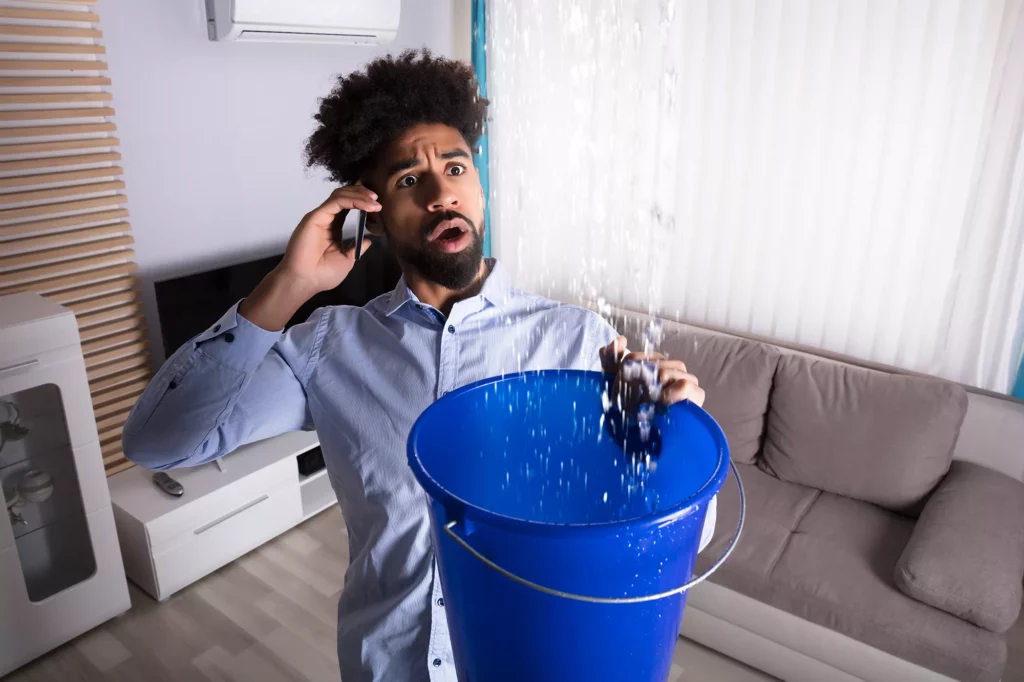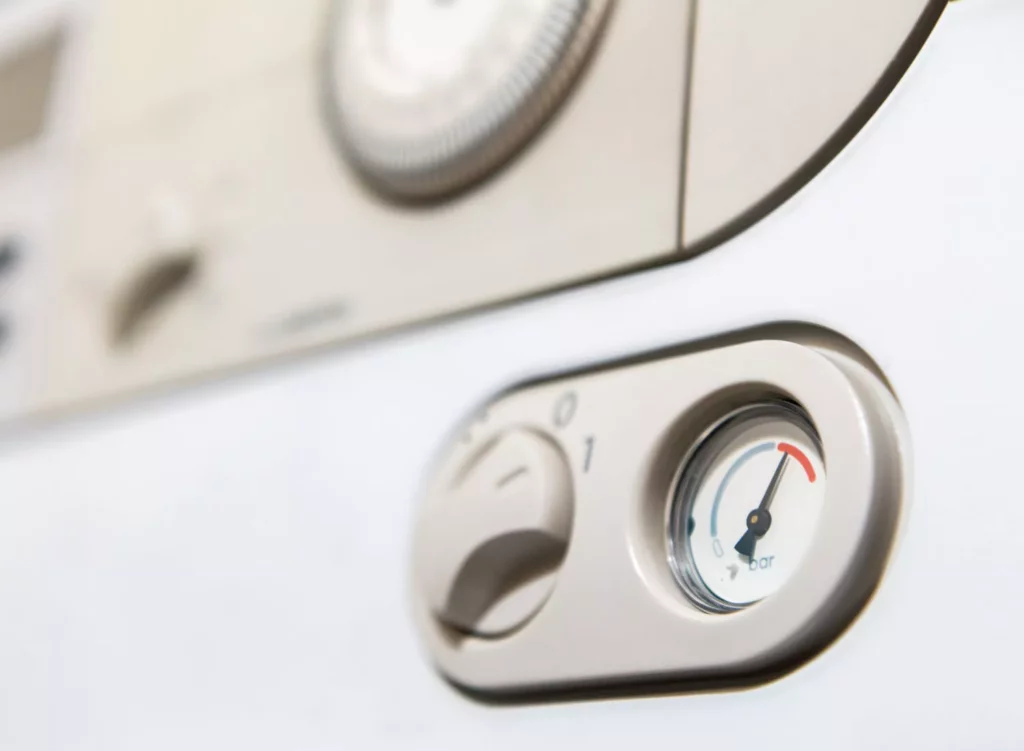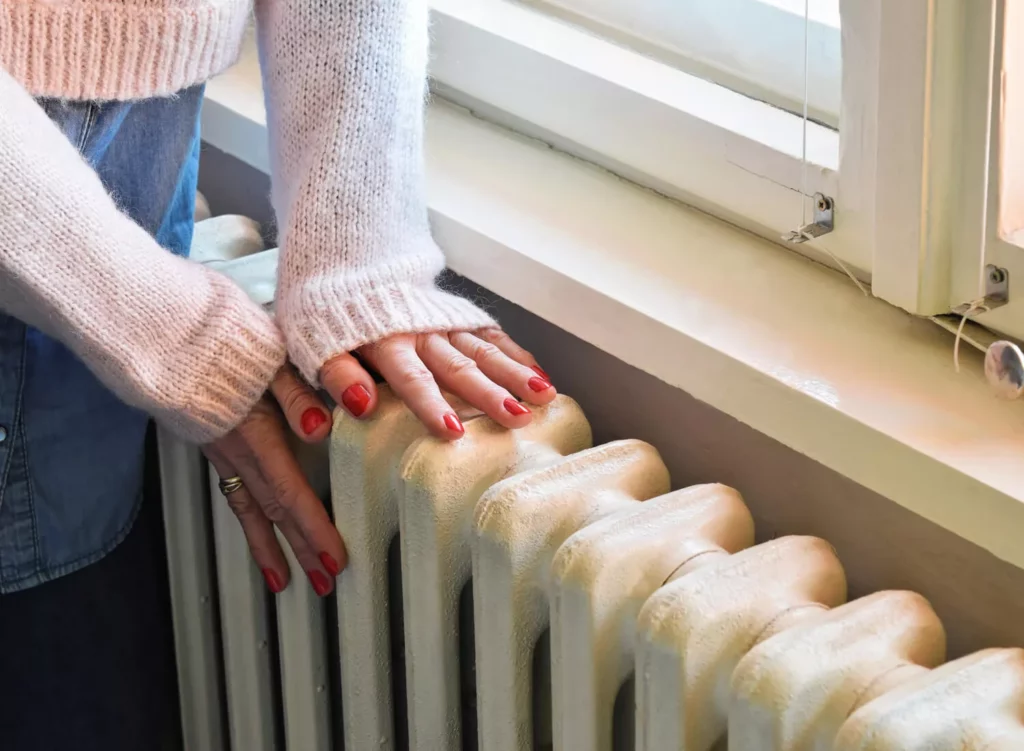- Leaking and dripping
- Kettling
- Thermostat issue
- Pilot light gone out
- Incorrect boiler pressure
- Radiators not heating
- No heat or hot water
- Frozen condensate pipe
- Boiler keeps turning off
1. Leaking & dripping
What to look out for
There are a number of reasons why your heating system could be leaking. These include:
- The boiler pressure is too high – This can cause the relief valve to start leaking water.
- Corrosion in pipes or water tank – A clue might be water pooling at the base of the boiler. If the corrosion has spread to multiple components, then you may have to invest in a new boiler.
- Faulty temperature probe – If the leak is coming from the temperature valve, the temperature probe may need replacing.

- Loose joints due to heat expansion – Your boiler will suffer natural wear and tear over time, with loosening joints and pipe connections being one of the most common.
- Damaged pump seals – The pump is a vital part of your home’s heating system as it pumps hot water directly to the radiators, taps, towel rails and showers around your home. If it isn’t sealed properly, a leak can occur.
- Poor installation – If your new boiler starts to leak soon after installation, it’s likely that it wasn’t fitted correctly. Make sure you get your boiler installed by a professional Gas Safe Engineer.
If you can’t rectify the leak yourself by tightening any exposed joints or adjusting the boiler pressure to the correct setting, you should call out an engineer to carry out further investigations.
2. Pilot light has gone out
If your boiler is not heating it could be that the pilot light has gone out. Your pilot light is a small gas flame that will ignite a more powerful gas burner, to help your boiler heat up quicker – If your pilot light is out then it’s likely stopping the gas supply.
What to look out for
It’s very important that you check there aren’t any issues with the gas supply. If your gas stopcock is turned on but your boiler and gas appliances aren’t working, then you should immediately contact your gas supplier.
If this isn’t the case, you can always try relighting the pilot light yourself by following the instructions inside your boiler manual.
3. No heat or hot water
Potential causes can be internal components inside the boiler failing. If that’s the case and you can’t get the boiler working, we’d suggest getting a Gas Safe engineer to thoroughly identify the problem and fix it.

What to look out for
If you find that you don’t have hot water, you might see an error code appear on the front of your boiler.
You can find out what error codes refer to your hot water, as well as a range of other issues, by consulting your boiler manual or by checking out one of our fault code pages.
Vaillant boiler fault codes
Baxi boiler fault codes
Ideal boiler fault codes
Worcester Bosch boiler fault codes
4. Kettling
What to look out for
If your boiler is making a strange noise (like a boiling kettle) you could have a build-up of sludge in your boiler’s heat exchange – this causes a restriction of water which begins to overheat and steam.
It isn’t a major issue, but we would recommend getting a Gas Safe engineer to carry out a chemical flush, which will clear out the build-up of sludge and ensure the boiler is working a lot more efficiently.

5. Incorrect boiler pressure
One of the most common reasons why boilers stop working is that the boiler pressure is either too low or too high.
Boiler pressure that is too high could be due to having too much water in the system or a sign that there are even faulty parts.
Boiler pressure that is too low may indicate that you have an inefficient system and underperforming system.
If you can’t find any visible leaks you may be lucky, and it just needs to be repressured – you can do this in about 2 minutes depending on your boiler.
To do this go to your boiler manufacturer’s website and they’ll have a section on how to repressure your exact boiler. Alternatively, you can check out our guide on correcting your boiler pressure.
If you don’t feel comfortable doing this, you can always call a Gas Safe engineer to sort it out for you.
What to look out for
A quick pressure check is simple to do – just go to your boiler and look at the gauge meter. If your needle is below 1, then you likely have low boiler pressure which is usually caused by a water leak somewhere in your system. Too high and it will be above the 2 bar.
7. Thermostat issues
If you’ve already checked your thermostat is correctly set up and you’ve not recently changed any settings, then your thermostat could think your home is warmer than it is.
What to look out for
To rule out this possibility, try increasing the temperature slightly, if the heating comes on and but says it’s a lot hotter than it actually is, you’ll know the thermostat is experiencing a heating error and a Gas Safe engineer or electrician can sort this out for you.
If that didn’t work, then your thermostat has likely malfunctioned and it’s definitely time to consider a replacement.
8. Radiators not heating
If only the bottom of the radiator is getting hot you may need to bleed it – bleeding a radiator is a fairly simple process you can do yourself.
If certain radiators aren’t getting hot in your home, then your radiators could need a re-balance. This can be done by yourself as the process involves a simple adjustment of valves on all the radiators – this should help to ensure each radiator is getting enough hot water to work effectively.
If your radiators aren’t heating up at all you may have a build-up of sludge in your system that is preventing the flow of hot water to the radiators.
You’ll need to get in touch with a Gas Safe Engineer to remove the build-up by chemically cleaning your system.

9. Boiler keeps turning itself off
We’ve already covered each of these issues above, but if you’re still having issues then you should leave it to a professional and get a Gas Safe Engineer to take a look.
What to look out for
To rule out this possibility, try increasing the temperature slightly, if the heating comes on and but says it’s a lot hotter than it actually is, you’ll know the thermostat is experiencing a heating error and a Gas Safe engineer or electrician can sort this out for you.
If that didn’t work, then your thermostat has likely malfunctioned and it’s definitely time to consider a replacement.
